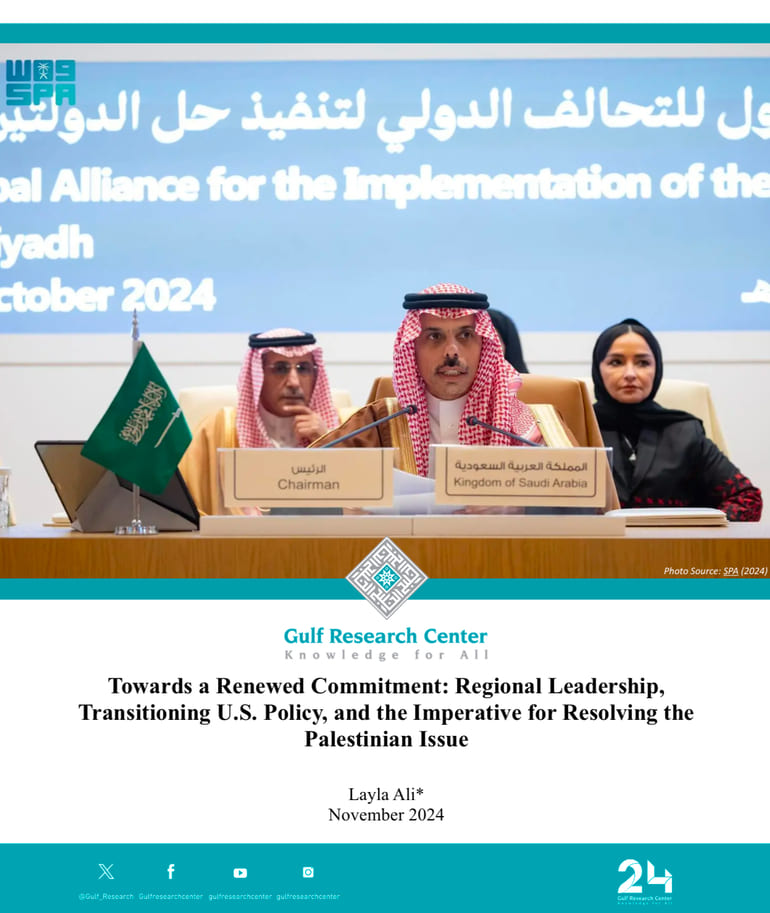
The Middle East remains at a crossroads, shapen by an intricate web of geopolitical challenges, unresolved conflicts, and shifting alliances. Among these, the Palestinian conflict is a critical fault line, with its resolution tied to the broader region’s security and stability. In this context, the events of October 7, 2023, marked another pivotal moment, with escalating violence in Gaza triggering a drawn out war that has plunged the region into an unprecedented humanitarian catastrophe. The grave violations of international law in both the Gaza Strip and the West Bank, including East Jerusalem, have further underscored the urgency of addressing the longstanding Palestinian issue.
Against this backdrop, the Kingdom of Saudi Arabia, in its role as Chair of the Arab-Islamic Ministerial Committee on Gaza -which includes Bahrain, Egypt, Jordan, Indonesia, Nigeria, Palestine, Qatar, Turkiye, the League of Arab States, the Organization of Islamic Cooperation, and with the support of European Union and Norway-, spearheaded the launch of the Global Alliance for the Implementation of the Two-State Solution during the Ministerial Meeting on “The Situation in Gaza and the Implementation of the Two-State Solution” on the sidelines of the 79th session of the United Nations General Assembly, held on September 26, 2024, in New York. The alliance— comprising key regional and international actors, represents a renewed commitment to resolving the Palestinian issue. By addressing the root causes of the conflict and ensuring adherence to international law, the alliance aims to establish a pathway toward lasting peace and stability in the Middle East by working towards an action plan for the creation of an independent Palestinian state and calling on other countries join the international consensus already represented by 149 countries that recognize Palestine.
Taking the crisis in Gaza as a point of departure, there is a recognition for the Kingdom that longstanding regional disputes must be tackled more proactively through multilateral diplomacy instead of being allowed to fester to the point of eruption.
Palestinian Issue: A Global Issue
R In the Gulf, the importance of resolving the Palestinian issue t is reflected in its interconnectedness with other regional and global priorities. For instance, the Houthis’ exploitation of the Palestinian cause to justify maritime attacks has disrupted global supply chains, highlighting the ripple effects of unresolved grievances. Such actions emphasize the urgency for a different and more effective approach to the Palestinian question. In response, the Gulf region has taken a leadership role in advocating for this urgency, recognizing that the security of Palestine is intrinsically linked to the security of Israel and the broader region. A resolution is not only a moral imperative but also a strategic necessity for achieving enduring regional stability.
The remarks by the EU High Representative Josep Borrell “30 years after Camp David, we haven’t succeeded on this two-state solution,” reflect the profound frustration over decades of stalled progress. The current transition to a new U.S. administration under Donald Trump further underscores the critical need for concrete and immediate actions to advance a Palestinian solution as the region grapples with the uncertainties of a second Trump administration. This includes both the possibility of even more explicit U.S. support for the Israeli government of Prime Minister
Netanyahu, as well as the return of the maximum pressure policy vis-a-vis Iran at a time when Saudi Arabia and the GCC states are committed to diplomatic outreach towards Tehran. In that context, a commitment to resolving existing conflict situations is not just a regional ambition but also a prerequisite for a more stable and secure global order.
The first high-level working meeting of the Global Alliance for the Implementation of the Two- State Solution, held in Riyadh on October 30-31, 2024, marked a milestone in rallying international commitment toward resolving the Palestinian issue. Attended by 94 government, regional, and international representatives, the meeting demonstrated broad support for this initiative. Building on this momentum, the second meeting, convened in Brussels on November 28, 2024, highlighted the commitment to sustaining this coalition. Participating states understand that maintaining this momentum is vital to formulating a comprehensive action plan, including steps for the recognition of Palestinian independence by countries that have yet to do so. It is also part of an effort to other nations that have so far refrained from joining this effort to do so and contribute to its concrete framework.
The Global Alliance therefore forges new diplomatic pathways and galvanizes the political will required from all stakeholders. By focusing on political, security, and accountability measures, the Alliance seeks to build a consenus among the parties involved to take tangible steps toward implementing a two-state solution. With time being of the essence, the development of a clear and actionable roadmap ensures that when the conditions are right, the groundwork will be ready for immediate implementation. Here, the Riyadh and Brussels meetings have laid the foundation for a global coalition united by the shared goal of recognizing Palestinian independence and fostering lasting peace.
As geopolitical dynamics evolve, Saudi Arabia and the GCC states have made it clear that waiting around is no longer an option and that the time to act is now. The sense within the Kingdom is that a renewed commitment and revised mechanism is required for the international community to uphold the principles of fairness and the universal application of the law. Developing a robust action plan built on accountability, security, and political courage ensures readiness to implement the two-state solution when the opportunity arises. Only through such sustained momentum, collaborative efforts, and unwavering resolve can the international community pave the way for a future where Palestine and Israel coexist peacefully, securing stability and prosperity for the entire region and beyond.
*Layla Ali is a Researcher at the Gulf Research Center (GRC).

